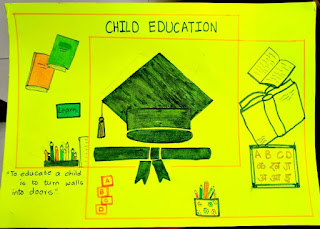Children's education has been playing a major role in today’s society. A person without education and qualification is worthless and seems like a handicapped person. One must be mentally and physically prepared to learn and adapt to new things in society. Education shows us the importance of hard work and, at the same time, helps us grow and develop. Although there had have made policies and rights regarding child education, children are still facing problems in getting one. Despite the children and societal needs, children who are way too far from their dreams are forced to end one. Education builds team spirit and discipline in children, which will help them and the country in the future growth and development. Education acquired during childhood teaches and molds a child in their communication and assists them to work as a team.
CHILD EDUCATION has always had a very huge impact on me, it is the SPARK I hold. During early September, I got a chance to conduct a program for children aiming at quality education awareness. First, my team members and I went to a nearby temple known as Mahadevsthan to get ourselves exposed to the beautiful nature by collecting all the local derived children. The children were very desperate and inclined to get involved in these activities that they loved.
The primary goal of the project was to distribute necessary materials to deprived children and to encourage them to read, breaking poverty. We were focused on raising awareness and spreading the importance of child education. The present children were also supposed to bring out their creativity through a drawing competition which was held on that particular day. Throughout the project, they additionally got a chance to engage themselves in mini-football competitions and clean up the temple area.
Considering the pandemic we also took all the safety measures along with gloves, masks, and sanitizers. The children were actively participating and they made the project even more fun. Firstly, we held a drawing competition, everyone was very thrilled to participate. The drawing competition brought out all the creativeness inside them. Further, we announced our winners and awarded each of them with storybooks to keep them motivated and never stop doing things they loved. My team members and I then successfully distributed reading materials such as copies, pens, sign-pen color, etc, and some reusable bags to the kids, promoting education. They were all very contented to receive the gifts where some of them also had tears filled in their eyes with joy. Next, we all took a little break and offered the children snacks, juice, and chocolates. Then, we held a mini football competition to add more fun and relaxing day to children. After the loving and fun day, we took all the children back home and had a long-lasting memorable day for life.
Overall the project was a huge success. Everyone learned various new things and got to know a lot of things from one’s perspective. After the completion of the project, my team members and I were deeply enlightened by the importance of education and how only one project can bring smiles and hope to their little eyes. We also hope to conduct these projects more in the near future because at the end of the day it is also our responsibility to lead a positive project to bring change and form a strong nation through the literate population. The project has deeply influenced me and had a more clear vision of my spark. The active participation from both my team members and children made the whole project more fun and astonishing.
This September has been very fruitful and informative for me. I was lucky enough to get to attend the Certificate Course on Social Artistry brought by ICA Nepal. The session included some incredible personalities involved in Social Artistry for more than a decade from across the globe. Some of the facilitators were Janet Sanders, supported by Evelyn Kurihara Philbrook, and the Social Artistry team of Nepal. Everyone has a little Spark within them, and throughout the session, we got the opportunity to explore those Spark. I am very considerate about the CHID EDUCATION, and I wish every child to be able to reach literacy, breaking poverty. Even though I want to do a lot of things aiming at child education, so far I haven't been able to make it. During the project, all the attendees were asked to conduct Spark Project in whatever thing they wish for leaving a positive message in society. All the financial support was also provided by the ICA Nepal to aspire them to start up. I will be forever grateful to the whole ICA team and the facilitators for the opportunity.
Prepared by: Swikriti Parajuli
I’m a student and I believe in learning and sharing. Besides community development, I’m passionate about arts, music, and sports.



























